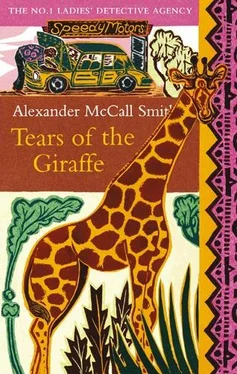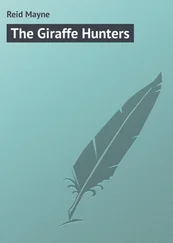I think that I can say that I had never been happier in my life. We had found a country where the people treated one another well, with respect, and where there were values other than the grab, grab, grab which prevails back home. I felt humbled, in a way. Everything about my own country seemed so shoddy and superficial when held up against what I saw in Africa. People suffered here, and many of them had very little, but they had this wonderful feeling for others. When I first heard African people calling others-complete strangers- their brother or their sister, it sounded odd to my ears. But after a while I knew exactly what it meant and I started to think the same way. Then one day, somebody called me her sister for the first time, and I started to cry, and she could not understand why I should suddenly be so upset. And I said to her: It is nothing. I am just crying. I am just crying. I wish I could have called my friends "my sisters," but it would have sounded contrived and I could not do it. But that is how I felt. I was learning lessons. I had come to Africa and I was learning lessons.
Michael started to study Setswana and he made good progress. There was a man called Mr Nogana who came to the house to give him lessons four days a week. He was a man in his late sixties, a retired schoolteacher, and a very dignified man. He wore small, round glasses, and one of the lenses was broken. I offered to buy him a replacement because I did not think that he had much money, but he shook his head and told me that he could see quite well and, thank you, it would not be necessary. They would sit on the verandah and Mr Nogana would go over Setswana grammar with him and give him the words for everything they saw: the plants in the garden, the clouds in the sky, the birds.
"Your son is learning quickly," he said to me. "He has got an African heart within him. I am just teaching that heart to speak."
Michael made his own friends. There were quite a few other Americans in Gaborone, some of whom were of a similar age to him, but he did not show much interest in these people, or in some of the other young expatriates who were there with diplomatic parents. He liked the company of local people, or of people who knew something about Africa. He spent a lot of time with a young South African exile and with a man who had been a medical volunteer in Mozambique. They were serious people, and I liked them too.
After a few months, he began to spend more and more time with a group of people who lived in an old farmhouse out beyond Molepolole. There was a girl there, an Afrikaner-she had come from Johannesburg a few years previously after getting into some sort of political trouble over the border. Then there was a German from Namibia, a lanky, bearded man who had ideas about agricultural improvement, and several local people from Mochudi who had worked in the Brigade movement there. I suppose that you might call it a commune of sorts, but then that would give the wrong idea. I think of communes as being the sort of place where hippies congregate and smoke dagga. This was not like that at all. They were all very serious, and what they really wanted to do was to grow vegetables in very dry soil.
The idea had come from Burkhardt, the German. He thought that agriculture in dry lands like Botswana and Namibia could be transformed by growing crops under shade-netting and irrigating them with droplets of water on strings. You will have seen how it works, Mma Ramotswe: the string comes down from a thin hosepipe and a droplet of water runs down the string and into the soil at the base of the plant. It really does work. I've seen it done.
Burkhardt wanted to set up a cooperative out there, based on that old farmhouse. He had managed to raise some money from somewhere or other and they had cleared a bit of bush and sunk a borehole. They had managed to persuade quite a number of local people to join the cooperative, and they were already producing a good crop of squash and cucumbers when I first went out there with Michael. They sold these to the hotels in Gaborone and to the hospital kitchens too.
Michael began to spend more and more time with these people, and then eventually he told us that he wanted to go out there and live with them. I was a bit concerned at first-what mother wouldn't be-but we came round to the idea when we realised how much it meant to him to be doing something for Africa. So I drove him out there one Sunday afternoon and left him there. He said that he would come into town the following week and call in and see us, which he did. He seemed blissfully happy, excited even, at the prospect of living with his new friends.
We saw a lot of him. The farm was only an hour out of town and they came in virtually every day to bring produce or get supplies. One of the Botswana members had been trained as a nurse, and he had set up a clinic of sorts which dealt with minor ailments. They wormed children and put cream on fungal infections and things like that. The Government gave them a small supply of drugs, and Burkhardt got the rest from various companies that were happy to dispose of time-expired drugs which would still work perfectly well. Dr Merriweather was at the Livingstone Hospital then, and he used to call in from time to time to see that everything was in order. He told me once that the nurse was every bit as good as most doctors would be.
The time came for Michael to return to America. He had to be at Dartmouth by the third week of August, and in late July he told us that he did not intend to go. He wanted to stay in Botswana for at least another year, he said. He had contacted Dartmouth, without our knowing it, and they had agreed to defer his taking up his place for a year. I was alarmed, as you can imagine. You just have to go to college in the States, you see. If you don't, then you'll never get a job worth anything. And I had visions of Michael abandoning his education and spending the rest of his life in a commune. I suppose many parents have thought the same when their children have gone off to do something idealistic.
Jack and I discussed it for hours and he persuaded me that it would be best to go along with what Michael proposed. If we attempted to persuade him otherwise, then he could just dig in further and refuse to go at all. If we agreed to his plan, then he might be happier to leave when we did, at the end of the following year.
"It's good work that he's doing," Jack said. "Most people of his age are utterly selfish. He's not like that."
And I had to agree he was right. It seemed completely right to be doing what he was doing. Botswana was a place where people believed that work of that sort could make a difference. And remember that people had to do something to show that there was a real alternative to what was happening in South Africa. Botswana was a beacon in those days.
So Michael stayed where he was and of course when the time came for us to leave he refused to accompany us. He still had work to do, he said, and he wanted to spend a few more years doing it. The farm was thriving; they had sunk several more boreholes and they were providing a living for twenty families. It was too important to give up.
I had anticipated this-I think we both had. We tried to persuade him, but it was no use. Besides, he had now taken up with the South African woman, although she was a good six or seven years older than he was. I thought that she might be the real drawing factor, and we offered to help her come back with us to the States, but he refused to entertain the notion. It was Africa, he said, that was keeping him there; if we thought that it was something as simple as a relationship with a woman then we misunderstood the situation.
We left him with a fairly substantial amount of money. I am in the fortunate position of having a fund which was set up for me by my father and it meant very little to leave him with money. I knew that there was a risk that Burkhardt would persuade him to give the money over to the farm, or use it to build a dam or whatever. But I didn't mind. It made me feel more secure to know that there were funds in Gaborone for him if he needed them.
Читать дальше









